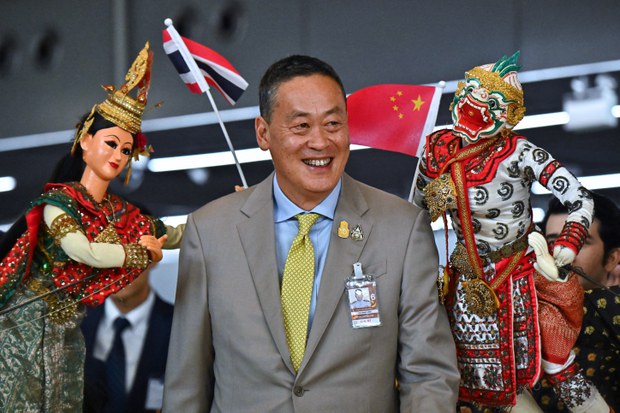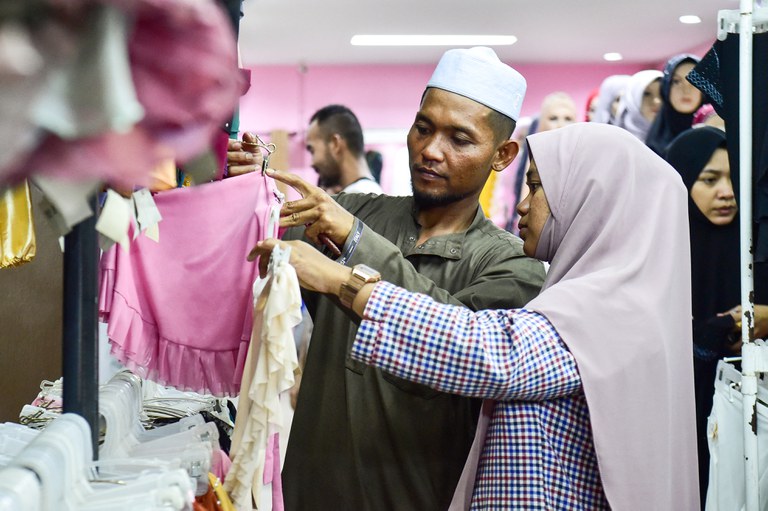Thai PM plans to inject $15.3B digitally to boost economy
2023.10.02
Bangkok
 Thai Prime Minister Srettha Thavisin walks through the arrivals gate after greeting Chinese tourists at Suvarnabhumi International Airport in Bangkok, Sept. 25, 2023.
Thai Prime Minister Srettha Thavisin walks through the arrivals gate after greeting Chinese tourists at Suvarnabhumi International Airport in Bangkok, Sept. 25, 2023.
Thai Prime Minister Srettha Thavisin announced Monday that citizens would get 10,000 baht (U.S. $274) through a digital wallet as part of his plan to stimulate the economy, despite criticism from the central bank that the money could be spent elsewhere.
Thailand’s new leader had campaigned on a platform of leading the country’s post-pandemic economic recovery. But he has yet to explain how his administration would raise money to pay for this stimulus program, which will cover all Thais aged 16 or older.
Srettha said the government planned to “inject 560 billion baht ($15.3 billion) to grow demand and supply in local communities which will nourish the grassroots level.”
“In 2024, money will be injected … to stimulate the demand and supply in creating a circular economy,” Srettha, a former real estate tycoon, told a government budgetary seminar in Bangkok.
“[L]imiting spending to the community always means money goes to the grassroots first. Make every sector participate in this economic activity.
He said the cabinet had set up a committee to develop a respective app, find the funds, set up all regulations and answer all the questions.
“Don’t worry, it will be functional by February,” Srettha said.
Under the plan, each recipient will be allowed to spend the money at shops within four km (2.5 miles) from where they live.
Srettha’s Pheu Thai Party, which won the second most parliamentary seats in the May 14 general election, has promised a series of economic upgrades including a daily minimum wage hike from 400 baht ($10.95) to 600 baht ($16.43) by 2027.
He said he expected Southeast Asia’s second largest economy to see its gross domestic product (GDP) grow by 5% over the next four years by opening new markets and establishing free trade agreements.
Srettha has kept mum about the source of money, though critics have expressed concern that he could be seeking the funding from the Government Savings Bank.
Some fear the proposal could be a repeat of a disastrous and corruption-plagued rice-price scheme under the government of Yingluck Shinawatra, the last Pheu Thai prime minister who was driven from office in a 2014 military coup. After Yingluck was deposed, the junta pursued criminal charges claiming that she had failed to stop corruption and losses of more than $5 billion in her administration’s scheme to buy rice crops from farmers at prices well above the market rate. The program failed as the global rice market plummeted.

Thailand had maintained the public debt level at 40% to 50% of the GDP for decades until the economy crumbled as a result of the COVID-19 pandemic. The current public debt is more than 60%, a record high.
Previously, the central bank governor criticized Srettha’s efforts.
“What we lack is not consumption, but investment,” Sethaput Suthiwartnarueput, governor of the Bank of Thailand, said in mid-September.
The bank is against the idea of establishing digital assets, he said.
On Monday, Srettha said he had been in touch with the governor and would discuss his plans in more detail.
An analyst, meanwhile, said the cash injection could cause trouble.
“The pro is it helps boost the economy quickly, but it is at risk of inflation and the government would have bigger public debt,” Isa Gharti, an analyst at Chiang Mai University, told BenarNews. “When the public debt jumps without the ability to grow GDP, it makes the economy vulnerable.”
Another analyst said the proposal on where the funding could be spent limits the types of products they can purchase even as not all local shops would benefit.
“We can see urban people buying a good electronic device or books, but rural people only have access to small grocery stores or agricultural products,” Don Hommanee, an independent researcher on labor and social welfare, told BenarNews.
“Many would not want to join the program because they have to enroll into the tax system before they could exchange the digital money into cash.”
Kunnawut Boonreak in Chiang Mai, Thailand, contributed to this report.







